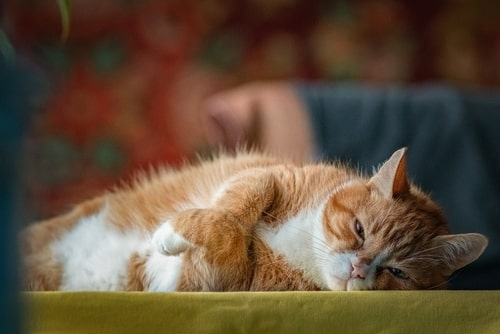As cats age, their health needs change, and they may become more prone to certain ailments. Senior cats—typically defined as cats over 7 years old—may experience a variety of health problems that can affect their quality of life. Understanding these common conditions and how to manage them can help ensure your feline companion lives a happy and comfortable life well into their golden years.
In this blog we will guide to some of the most common health issues seen in senior cats, along with tips for prevention, early detection, and care.
1. Arthritis and Joint Pain
Arthritis is a common condition in senior cats, and it's often underdiagnosed because cats tend to hide pain and discomfort. Cats with arthritis experience inflammation in their joints, which can lead to pain, stiffness, and difficulty moving.
Signs to Look For:
- Reduced activity and play
- Difficulty jumping or climbing
- Limping or favoring one leg
- Hiding or avoiding interaction
- Trouble using the litter box (especially if the box is high-sided)
Management and Care:
- Pain relief: Anti-inflammatory medications prescribed by a vet can help reduce swelling and pain.
- Joint supplements: Glucosamine and chondroitin supplements can support joint health.
- Weight management: Overweight cats are at greater risk of joint stress. A balanced diet and weight control can alleviate some pressure on the joints.
- Comfortable environment: Provide low, easy access to favorite spots and softer bedding.
2. Chronic Kidney Disease (CKD)
Chronic kidney disease is one of the most common ailments in senior cats, especially those aged 10 and above. The kidneys gradually lose their ability to filter waste products from the blood, leading to toxin buildup.
Signs to Look For:
- Increased thirst and urination
- Loss of appetite and weight loss
- Vomiting and lethargy
- Poor coat condition
- Bad breath with an ammonia-like odor
Management and Care:
- Diet: Cats with CKD benefit from a special prescription diet that is lower in protein and phosphorus to reduce kidney workload.
- Hydration: Encourage drinking water or use a cat water fountain. Some cats may also benefit from subcutaneous fluids administered at home by a vet.
- Regular veterinary check-ups: Blood tests and urine analysis will help monitor kidney function and detect early stages of kidney disease.
3. Hyperthyroidism
Hyperthyroidism is a common endocrine disorder in older cats, where the thyroid gland produces excessive thyroid hormones, speeding up metabolism. This condition often causes weight loss, even with increased appetite.
Signs to Look For:
- Unexplained weight loss
- Increased hunger and thirst
- Hyperactivity or restlessness
- Vomiting and diarrhea
- Poor coat condition and shedding
Management and Care:
- Medication: Anti-thyroid medications, such as methimazole, can help regulate thyroid hormone levels.
- Surgery or radioactive iodine: In some cases, surgically removing the thyroid gland or using radioactive iodine therapy can offer a more permanent solution.
- Diet: A special diet that limits iodine (which is necessary for thyroid hormone production) can help manage the disease.
4. Dental Disease
Dental issues are common in senior cats, and they can range from gingivitis and tartar buildup to more severe conditions like periodontal disease or tooth loss. Dental pain can affect a cat’s ability to eat properly and can lead to other systemic health problems if untreated.
Signs to Look For:
- Bad breath
- Drooling or difficulty eating
- Pawing at the mouth or face
- Tooth discoloration or visible tartar
- Change in eating habits (e.g., preference for softer foods)
Management and Care:
- Regular dental check-ups: A vet will check for signs of dental disease during regular exams.
- Professional cleanings: If tartar buildup is severe, your cat may need a professional cleaning under anesthesia.
- Home dental care: Brushing your cat's teeth with a pet-safe toothbrush and toothpaste can help prevent buildup.
- Dental treats and toys: Specially designed dental products can help reduce plaque and tartar formation.
5. Diabetes Mellitus
Diabetes is a growing concern in senior cats, particularly those that are overweight. It occurs when the cat’s body either cannot produce enough insulin or becomes resistant to it, leading to elevated blood glucose levels.
Signs to Look For:
- Increased thirst and urination
- Weight loss despite a normal or increased appetite
- Lethargy and weakness
- Poor coat condition
- Vomiting or changes in appetite
Management and Care:
- Insulin injections: Diabetes is typically managed with insulin injections, which help regulate blood sugar levels.
- Diet: A high-protein, low-carbohydrate diet is recommended for diabetic cats to help manage blood sugar levels.
- Regular blood tests: Regular vet visits to monitor blood glucose levels are essential for adjusting insulin dosage.
6. Heart Disease
Heart disease, particularly hypertrophic cardiomyopathy (HCM), is common in senior cats. HCM is a condition where the heart muscle becomes abnormally thickened, which can impair the heart's ability to pump blood effectively.
Signs to Look For:
- Difficulty breathing or rapid breathing
- Lethargy or weakness
- Coughing or gagging
- Lack of appetite
- Sudden collapse or fainting (in severe cases)
Management and Care:
- Medication: Beta-blockers, calcium channel blockers, or diuretics may be prescribed to help manage heart disease.
- Monitoring: Regular veterinary check-ups, including heart auscultation and possibly an ultrasound, can monitor heart function.
- Reduced stress: Stress can worsen heart conditions, so it’s important to create a calm, predictable environment.
7. Cancer
Cancer is unfortunately more common in older cats, and it can affect any part of the body. The signs of cancer can vary depending on the type and location of the tumor, but many cancers develop slowly over time.
Signs to Look For:
- Unexplained weight loss
- Lumps or bumps under the skin
- Difficulty eating or swallowing
- Lethargy or loss of interest in normal activities
- Vomiting or diarrhea
Management and Care:
- Early detection: Routine veterinary check-ups and screenings, including blood tests and imaging, can help detect cancer early.
- Treatment options: Treatment may include surgery, chemotherapy, or palliative care depending on the type and stage of cancer.
8. Cognitive Dysfunction Syndrome (CDS)
Much like dementia in humans, cognitive dysfunction syndrome (CDS) affects older cats and leads to confusion, memory loss, and changes in behavior. This condition is linked to the aging of the brain, resulting in reduced cognitive function.
Signs to Look For:
- Disorientation or confusion (e.g., getting lost in the house)
- Changes in sleep patterns (e.g., sleeping more during the day or being restless at night)
- Increased vocalization or meowing
- Reduced interest in play or socializing
- House soiling
Management and Care:
- Environmental enrichment: Keep your cat’s mind active with toys, puzzles, and interactions.
- Dietary supplements: Certain supplements, such as antioxidants and omega-3 fatty acids, may help support brain function.
- Regular routines: Establishing predictable routines can help reduce anxiety and confusion.
Conclusion:
As your cat ages, regular veterinary visits become increasingly important to monitor for common age-related health conditions. Many of these conditions can be managed effectively with early detection and proper care, allowing your feline companion to live a long, comfortable life.
If you notice any signs of illness or changes in behavior, don’t hesitate to consult your veterinarian. With the right support, your senior cat can continue to enjoy their twilight years with the love and attention they deserve.
For more guidance and consultancy feel free to reach out to me. I'd be happy to assist you.








0 Comments